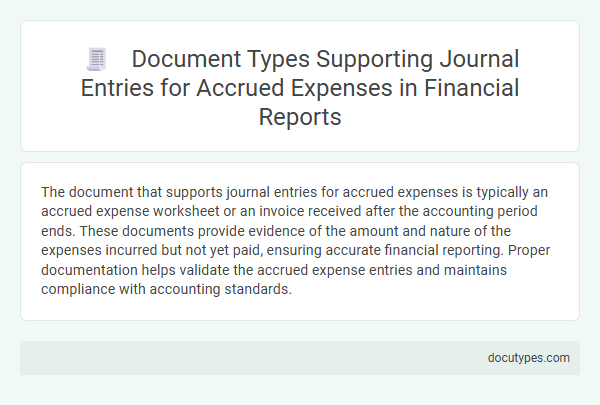The document that supports journal entries for accrued expenses is typically an accrued expense worksheet or an invoice received after the accounting period ends. These documents provide evidence of the amount and nature of the expenses incurred but not yet paid, ensuring accurate financial reporting. Proper documentation helps validate the accrued expense entries and maintains compliance with accounting standards.
Introduction to Accrued Expenses in Financial Reporting
| Introduction to Accrued Expenses in Financial Reporting | |
|---|---|
| Definition of Accrued Expenses | Accrued expenses represent liabilities for goods or services received but not yet paid by the end of an accounting period. They arise when expenses are recognized before cash payments occur, in accordance with the accrual basis of accounting. |
| Importance in Financial Reporting | Accrued expenses ensure that financial statements accurately reflect all incurred costs within the reporting period. Recognizing these expenses improves the matching of revenues and expenses, leading to more reliable financial information. |
| What Documents Support Journal Entries for Accrued Expenses? |
|
| Role of Supporting Documents | Documents provide essential evidence for auditors and stakeholders verifying the accuracy and legitimacy of accrued expense transactions. They ensure compliance with accounting standards such as GAAP or IFRS. |
Importance of Supporting Documents for Journal Entries
Supporting documents for journal entries related to accrued expenses include invoices, receipt records, and service agreements. These documents are essential for verifying the accuracy and legitimacy of the expenses recorded in financial statements. Ensuring your journal entries are backed by proper documentation enhances transparency, aids in audit processes, and maintains compliance with accounting standards.
Types of Source Documents for Accrued Expenses
Understanding the types of source documents that support journal entries for accrued expenses ensures accurate financial reporting. These documents provide the necessary evidence to record expenses incurred but not yet paid.
- Vendor Invoices - Official bills received from suppliers that detail the goods or services provided during the accrual period.
- Payroll Records - Documentation showing salaries and wages earned by employees before payment.
- Contracts and Agreements - Legal documents specifying obligations incurred that lead to accrued expenses.
Your accurate record-keeping of these source documents facilitates proper accrual accounting and audit compliance.
Invoices and Billing Statements
Invoices and billing statements are essential documents that support journal entries for accrued expenses. These records provide detailed evidence of amounts owed and services received, ensuring accurate financial reporting. You should retain these documents to verify and substantiate accrued expense entries during audits or financial reviews.
Contracts and Service Agreements
Contracts and service agreements provide essential documentation supporting journal entries for accrued expenses. These documents outline the terms and obligations that create the basis for recognizing expenses before payment.
You should review the specifics of these agreements to accurately record accrued liabilities in your accounting records. Clear references to contract terms help verify the timing and amounts of accrued expenses reported in the financial statements.
Timesheets and Payroll Summaries
What document supports journal entries for accrued expenses related to labor costs?
Timesheets provide detailed records of hours worked by employees, serving as primary evidence for accrued labor expenses. Payroll summaries consolidate wage data, ensuring accurate posting of salary-related journal entries for financial reporting.
Receiving Reports and Delivery Confirmations
Receiving reports and delivery confirmations are essential documents that support journal entries for accrued expenses. These records provide evidence of goods or services received but not yet invoiced, ensuring accurate financial reporting.
Your accounting team relies on these documents to verify the timing and amount of expenses accrued. Proper documentation helps maintain the integrity of accrual accounting and facilitates audit compliance.
Expense Accrual Schedules
Expense accrual schedules are critical documents that support journal entries for accrued expenses by detailing the amounts and dates of expenses incurred but not yet paid. These schedules provide an organized summary that ensures accurate financial reporting and budget management.
- Expense Accrual Schedule - Lists all accrued expenses with corresponding amounts and relevant periods to be recorded in the journal entries.
- Supporting Invoices - Provides verification for amounts included in the accrual schedule by referencing vendor invoices or service agreements.
- Approval Documentation - Contains internal authorization or managerial approval confirming the validity of the accrued expense amounts reported.
Correspondence and Approval Memos
Document support for journal entries related to accrued expenses primarily includes correspondence and approval memos. These documents provide necessary evidence to validate the recognition of expenses incurred but not yet paid.
Correspondence often consists of emails or letters confirming the receipt of goods or services and the obligation to pay. Approval memos serve as formal authorization from management or relevant departments, ensuring the accuracy and legitimacy of the accrued expense. Your accounting records rely on these documents to maintain compliance and accountability during financial reporting.
What Document Supports Journal Entries for Accrued Expenses? Infographic

